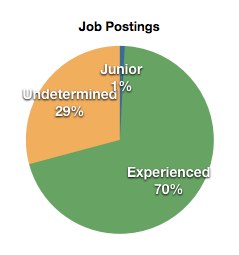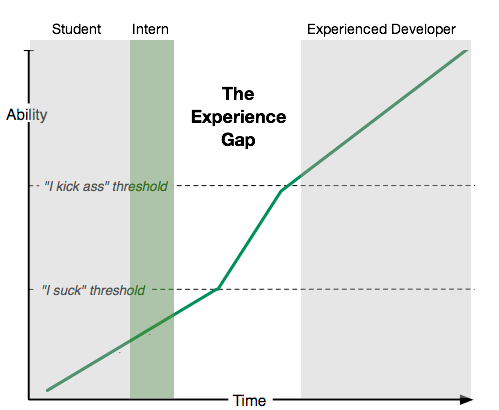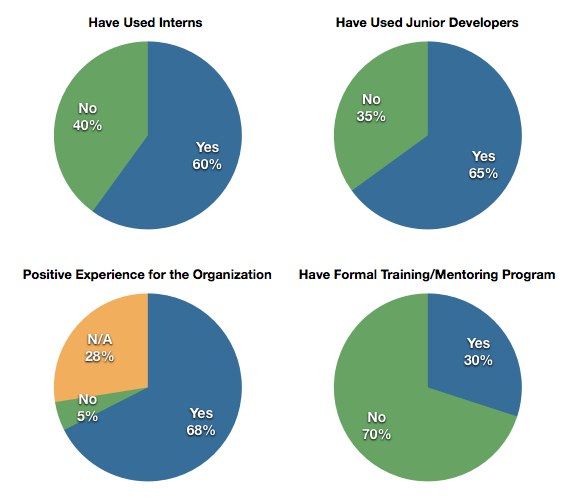In part 1 of this post I shared how I got started on the line of thinking that we as a community are planting a lot of seeds, spreading the fertilizer, but not doing much tending to the Talent crops. In the second part of this post, I’ll share just how some of the numbers support the ideas behind why newbie developers are having some issues crossing the gap, or, to go with the opening theme for this second post, blooming...
 Once a student has had some training, then what? Will they be able to find a job as a Drupal developer? Not likely. I looked at 120 consecutive job postings from February 16-25, 2012 on http://groups.drupal.org/jobs. Of these, exactly one was for a "junior developer" (actually, that's a lie, there was another that was looking for a "junior drupal developer" with "1+ years experience building enterprise-level solutions" - I put this seemingly contradictory posting in the "undetermined" category). 84 of the 120 posts were for experienced developers. These 84 posts used terms like "proven track record", "well-versed", "guru", and "senior" in their descriptions. There were 35 posts that I considered "undetermined" due mainly to vagueness and that fact that I only speak one language.
Once a student has had some training, then what? Will they be able to find a job as a Drupal developer? Not likely. I looked at 120 consecutive job postings from February 16-25, 2012 on http://groups.drupal.org/jobs. Of these, exactly one was for a "junior developer" (actually, that's a lie, there was another that was looking for a "junior drupal developer" with "1+ years experience building enterprise-level solutions" - I put this seemingly contradictory posting in the "undetermined" category). 84 of the 120 posts were for experienced developers. These 84 posts used terms like "proven track record", "well-versed", "guru", and "senior" in their descriptions. There were 35 posts that I considered "undetermined" due mainly to vagueness and that fact that I only speak one language.
Coincidentally, as I was writing this post, the Drupal Association hired its first intern. Internships are generally designed for students, as a way for them to get some initial hands-on experience. Assuming this is true, this helps close the experience gap.
Internships are generally designed for students, as a way for them to get some initial hands-on experience. Assuming this is true, this helps close the experience gap.
But still, for the vast majority of new Drupal developers, the experience gap is a significant hurdle. Clearly, experienced Drupal developers are in high demand, but where are they coming from? The community is clearly providing more-and-more training opportunities every month, but are we also providing more internships and junior developer programs? AcquiaU (a training program combined with a junior-level job program) and the Myplanet fellowship program are the only two that I’m aware of.
Survey
As I started putting my thoughts down, I realized I didn't have any hard-data to back up anything I was saying about this experience gap - it was all anecdotal. Therefore, I put together a quick survey and posted it on Drupal Planet. 40 people responded to the survey in the short time it was available. Two-thirds of respondents have used either interns or junior developers in the past, but only one-third have a formal mentoring/training program in place (I’d love to hear more about these programs - please leave a comment below, contact me /contact, or post something on Drupal Planet!). Of those that have hired interns or junior developers in the past, two-thirds of those had a positive experience. So, out of the 40 respondents, only about 16 (about 40%) have had a positive experience with an intern or junior developer. These values were higher than I expected.
Two-thirds of respondents have used either interns or junior developers in the past, but only one-third have a formal mentoring/training program in place (I’d love to hear more about these programs - please leave a comment below, contact me /contact, or post something on Drupal Planet!). Of those that have hired interns or junior developers in the past, two-thirds of those had a positive experience. So, out of the 40 respondents, only about 16 (about 40%) have had a positive experience with an intern or junior developer. These values were higher than I expected.
The survey also confirmed a portion of what I have witnessed personally working with DrupalEasy's interns and junior developers as well as my discussions with various DCSP employers: the time and resources required to train/mentor new Drupal talent is significant, and often underestimated.
To my surprise though, it also indicated that a majority of organizations of all sizes have utilized interns and/or junior developers in the past. I can only assume either or both of the following are true:
- The number of available internships and junior developer positions is dwarfed by number of available positions for experienced developers. For example, if all 18 DCSP participants immediately found full-time Drupal work, this would only satisfy about 1.5 days worth of “experienced” job postings on groups.drupal.org/jobs
- Many of these positions are never publicly posted, the positions are filled using some other method. This wouldn't surprise me because I don't believe that DrupalEasy has ever posted a job posting, we generally find team members by word-of-mouth.
Old Way
So, assuming that the number of available intern and junior developer positions is not enough to satisfy demand, how can we as a community ramp-up the number of experienced Drupal developers?
I think it is safe to say that a significant majority of the current expert-level experienced developers in the community (let's say those with a Drupal.org user account older than five years) crossed this experience gap on our own. Picking up small contracting and consulting gigs as we started off, then as our skills increased, the jobs got bigger, until we crossed the "I kick ass" threshold. Is this method sustainable?
More so, is this method possible for everyone currently crossing the "I suck" threshold? I think not. I'd argue that the skillset to be a successful contractor/consultant is not the same skillset as that of a Drupal developer. I believe that there are developers who have the potential to be Drupal development rockstars, but don't have the skillset to be contractors/consultants. Without a robust junior developer eco-system, how do these people cross the experience gap? One answer is more junior developer programs.
New Way I think the Drupal community needs to make a concerted effort to develop junior developer positions (Jacob Singh’s session at DrupalCon Denver will be a good place to start). If we put in the same level of effort as we did to ramp-up classroom training opportunities, our task is complete. If we don't, then I fear that eventually, Drupal's crazy growth rate will slow due to the lack of experienced developer resources. Organizations of all sizes can profit from junior developers by having them perform tasks such as writing documentation, performing quality assurance, training clients, and other Drupal-related tasks commensurate with their current skill level. Drupal development shops (like DrupalEasy) need to decide if we're makers or takers. Do we want to just take Drupal rockstars, or do we also want to make Drupal rockstars?
I think the Drupal community needs to make a concerted effort to develop junior developer positions (Jacob Singh’s session at DrupalCon Denver will be a good place to start). If we put in the same level of effort as we did to ramp-up classroom training opportunities, our task is complete. If we don't, then I fear that eventually, Drupal's crazy growth rate will slow due to the lack of experienced developer resources. Organizations of all sizes can profit from junior developers by having them perform tasks such as writing documentation, performing quality assurance, training clients, and other Drupal-related tasks commensurate with their current skill level. Drupal development shops (like DrupalEasy) need to decide if we're makers or takers. Do we want to just take Drupal rockstars, or do we also want to make Drupal rockstars?
I'm putting my money where my mouth is. I currently have 2 DCSP interns, and I plan on keeping them on as junior-level contractors when their internships are complete. It does take time and effort, but even for a smaller shop like ours, its worth it to nurture talent to help Drupal (and DrupalEasy) grow down the road. I also plan on providing junior-level contracting work for other DCSP graduates (shhh, don't tell them yet) and helping as many others as I can find contracting work via my contacts in the Drupal community.
Who's with me?
If you're heading to DrupalCon Denver, there will be a Drupal Workforce Development Programs BoF at 1pm Wednesday.
Thanks to the following people for reviewing and providing input to this article: Ryan Price, Andrew Riley, Heather James, Jacob Singh, Chris Shattuck, Erich Ludwig, Don Vandemark, and Dave Terry.

Comments
I'd suggest there are two
I'd suggest there are two alternative reasons for the lack of junior developer adverts:
1) Junior developers are easier to find, which means the job adverts aren't up for as long and aren't posted to as many job boards.
2) Junior developers will apply for jobs that they don't quite meet the requirements for and many will get hired.
Hi! I like the idea behind
Hi!
I like the idea behind this article to train the inexperienced ones a bit further. Right now I'm experiencing this gap myself. I learnt everything by myself and with the help of a lot of tutorial videos( without advertising, Lullabot and BuildaModule were a great help for me), but as you go further and deeper into Drupal the learning process slows down. I recently bumped into the great Druapl Ladder initiation, which may help keeping up the learning curve.
I noticed that in the first article you set the kick ass thresold under the custom module development. Since I'm trying to find a Drupal related job for about 3 months I can say, that the vast majority who offers a job is looking ofr someone with module development experiences, so if you don't have that you have two options as I see:
Either you apply to a lot of these and hope that you can live up to the expectations and learn it quick in the case they hire you.
Or build a kick ass portfolio-which is possible without building custom modules thanks to the community:) The disadvantage of tha latter is that it takes time and for me it's not something that financially meets the market, but in long term it pays back.
Unfortunately the Junior positions I found were 99% local jobs, so for that you have to be lucky and live in the right place.
Didn't want to write that long, but I wanted to have an oppinion here from the "searching" side. And I hereby pledge that the time I have a kickass company I'll help the Juniros to cross this gap:)